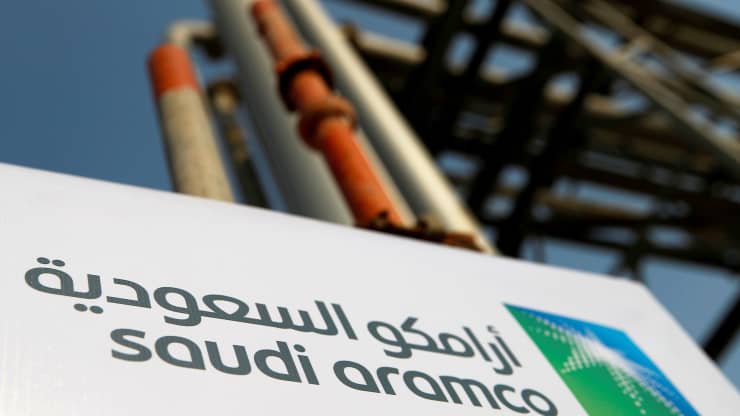DUBAI, United Arab Emirates — Saudi Arabia’s oil giant Aramco has posted a 158% increase in third quarter net income to $30.4 billion, as the world’s largest oil companies continue to benefit from the reopening of the global economy and soaring oil and gas prices.

The result beat expectations, with analysts expecting a median net income of $29.1 billion for the quarter. Aramco reported net income of $11.8 billion in the third quarter of 2020.
“Our exceptional third quarter performance was a result of increased economic activity in key markets and a rebound in energy demand,” Aramco President and CEO Amin Nasser said on Sunday.
“Some headwinds still exist for the global economy, partly due to supply chain bottlenecks, but we are optimistic that energy demand will remain healthy for the foreseeable future,” Nasser added.
Aramco said the increase in net income was the result of higher crude oil prices and volumes sold, and stronger refining and chemicals margins in the quarter, as the company benefits from rebounding global energy demand and increased economic activity in key markets.
Market windfall
WTI crude oil has soared above $85 in recent weeks, a level not seen since 2014, as the market shifts focus from demand recovery to supply scarcity. Natural gas prices are up around 130% this year, meaning the full extent of the global energy crisis is more likely to be felt in the fourth quarter results.
Aramco declared a significant dividend of $18.8 billion to be paid in the fourth quarter. The payout can be covered by a jump in free cash flow to $28.7 billion in the third quarter, up from $12.4 billion for the same period in 2020. Gearing, a measure of the company’s debt position, also improved to 17.2% from 23% due to higher oil prices and stronger cash flows.
Aramco also said it would “invest for the future” with capital expenditure of $7.6 billion in the third quarter, representing a 19% increase, compared with the same period in 2020. Aramco said it expected 2021 capital expenditure to be approximately $35 billion.
The results confirm a bumper quarter for “Big Oil,” a term used to refer to the world’s largest oil and gas companies. U.S. oil majors ExxonMobil and Chevron also benefited from rising prices, reporting profit that soared to multiyear highs in the quarter. Royal Dutch Shell reported record cash flow, while TotalEnergies also saw a sharp rise in performance.
Profit and pressure
The strong numbers come as the sector faces renewed scrutiny from activists and cynicism over its climate ambitions. Companies, including Aramco and the UAE oil giant Adnoc, have launched climate initiatives just days ahead of the COP26 climate summit, while simultaneously planning to invest to increase oil production in the coming years.
″I think most people would agree that climate change is one of the biggest challenges facing society,” Aramco Chairman Yasir Al-Rumayyan told CNBC via email.
“We need a transition that does not ignore that petrochemicals are essential building blocks to modern life — including the smartphones we all use and the products we rely on to fight COVID,” he added.
Aramco aims to achieve net zero emissions from its wholly-owned operations by 2050, and simultaneously plans to increase oil output to 13 million barrels a day by 2037. A separate pledge from Saudi Arabia to invest almost $190 billion to achieve net zero emissions by 2060 received both praise and skepticism from oil industry observers.
“The reality is that the energy transition will be long and complex, and therefore oil and gas will continue to play a key role,” Al-Rumayyan said, while also offering commentary on the recent energy crisis and its link to the energy transition.
“Recent energy disruptions around the world are evidence of the need for a stable and inclusive energy transition,” Al-Rumayyan said. “We need a transition that provides a reliable, affordable and low-cost supply of energy that leaves no one behind,” he added.
Aramco said it would disclose further details on how it plans to navigate the energy transition and achieve its net zero strategy in its Sustainability Report due out in the second quarter of 2022.
“We fully recognize that we have a long way to go, and that the journey will not be easy,” Al-Rumayyan said. “We are confident that we can meet the challenges and provide the leadership, expertise, and tools to support global progress towards a low-emissions future.”
[contextly_sidebar id=”pVuNLxbWZgWqdS6Tfs36OnWSviJEN6lp”]







